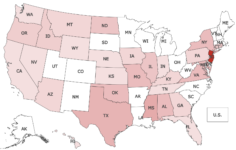 Legislation that would move all or most public notice in three states to government websites passed significant milestones last month. Bills in Indiana and Kentucky were approved by the Houses of Representatives in those states by comfortable margins, while another in Idaho’s lower chamber barely squeaked by.
Legislation that would move all or most public notice in three states to government websites passed significant milestones last month. Bills in Indiana and Kentucky were approved by the Houses of Representatives in those states by comfortable margins, while another in Idaho’s lower chamber barely squeaked by.
The most significant threat to newspaper notice appears to be the assault launched in Indiana, where HB-1312 would eventually allow all public and private notices in the state to be posted on a website established by the Indiana Office of Technology (IOT). It passed the House on Feb. 18 by a 57-36 vote.
Which public notice bill will become law in Kentucky?
 It’s been over a month since the Kentucky legislature passed two different, slightly conflicting public notice bills. There has been some confusion about which one will become law when the current statute sunsets on June 30, but that question appears to have been answered last week.
It’s been over a month since the Kentucky legislature passed two different, slightly conflicting public notice bills. There has been some confusion about which one will become law when the current statute sunsets on June 30, but that question appears to have been answered last week.
When we last left the Bluegrass State, HB195 had been vetoed by Gov. Andy Beshear (D) and HB351 had not. The governor later used his line-item veto to strike a number of provisions in HB351, a budget bill, including those relating to public notice. The Republican-dominated legislature ultimately overturned both of Beshear’s vetoes.
New Kentucky public notice law maintains status quo ante
 After following a convoluted path that included two different bills, half a dozen amendments, five floor votes and a grand compromise, the Kentucky legislature passed a bill last week ensuring that the state’s public notice law would remain mostly unchanged.
After following a convoluted path that included two different bills, half a dozen amendments, five floor votes and a grand compromise, the Kentucky legislature passed a bill last week ensuring that the state’s public notice law would remain mostly unchanged.
The original public notice provisions of both HB195 and HB351 would have moved all government notice in the Bluegrass State from newspapers to government websites. Following a compromise earlier this year between the Kentucky Press Association (KPA) and the associations representing cities and counties in the state, HB195 was amended to exclude counties with population under 80,000. That amendment brought it closer to the state’s current law — passed two years ago and due to sunset this summer — which allows counties with population above 90,000 to run notices on their own websites; decreasing the population threshold by 10,000 would have increased the number of website-notice-only counties from eight to ten.
The Kentucky Compromise
 Republican domination of Kentucky’s statehouse has not been a positive development for the Bluegrass State’s public notice laws, which have been under siege for the better part of the last decade. The fight came to a head in 2017, when the GOP assumed majority-party status in both chambers for the first time in the state’s modern history.
Republican domination of Kentucky’s statehouse has not been a positive development for the Bluegrass State’s public notice laws, which have been under siege for the better part of the last decade. The fight came to a head in 2017, when the GOP assumed majority-party status in both chambers for the first time in the state’s modern history.
After failing to move public notice legislation via the normal committee process in 2017, state Senator Chris McDaniel (R-Covington) added language to a budget bill authorizing local governments in counties over 90,000 in population to publish most government notices on their own websites. McDaniel’s amendment also allowed school districts in the state to publish annual financial statements on their websites instead of newspapers. The bill eventually passed both the House and Senate, but former Governor Matt Bevin vetoed it because it raised taxes. His veto was overridden.
